Selecting the Air Ideal Conditioner for Your Hotel: A Comprehensive Guide for Hotel Management
In the world of hospitality, where guest comfort reigns supreme, the choice of the right conditioner for your hotel is more than a matter of mere convenience—it's a pivotal decision that can define the quality of your guests' experiences and the efficiency of your operations. From maintaining the perfect room temperature to ensuring clean and fresh air quality, a well-selected hotel conditioning system is the silent champion that makes it all possible.
In this comprehensive guide, tailored exclusively for hotel management, we delve into the intricacies of selecting the ideal AC hotel for your property. We understand that the stakes are high; after all, your guests' satisfaction and the hotel's operational efficiency hang in the balance. Whether you're considering a major system upgrade, planning for a new construction, or simply looking to enhance your current setup, this article is your compass.
So, as we embark on this journey, let's delve deep into the world of conditioning systems for hotels and discover how to make a choice that ensures both the comfort of your guests and the success of your hotel's operations.
Assessing Your Hotel's Needs
Understanding the unique requirements of your hotel is the crucial first step in selecting the ideal air conditioning system. Your choice will impact guest comfort, operational efficiency, and ultimately, your hotel's reputation. To make an informed decision, it's imperative to assess your hotel's specific needs comprehensively.
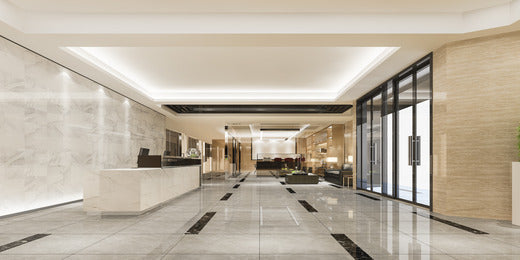
Significance of Understanding Your Hotel's Requirements:
- Guest Comfort: The primary objective of any hotel is to ensure guest comfort and satisfaction. The right air conditioning system plays a pivotal role in achieving this goal, providing the desired temperature, humidity levels, and air quality.
- Operational Efficiency: An air conditioning system that aligns with your hotel's needs not only enhances guest experience but also contributes to operational efficiency. It affects energy consumption, maintenance costs, and system reliability.
- Sustainability: In an era of increasing environmental awareness, choosing an air conditioning system that aligns with sustainable practices can enhance your hotel's reputation and reduce its carbon footprint.
Factors to Consider When Assessing Your Hotel's Needs:
- Size of the Property: The physical size of your hotel significantly impacts the cooling and heating requirements. Larger properties may require central air systems, while smaller hotels might find split or ductless systems sufficient.
- Location: The geographic location of your hotel plays a crucial role. Consider whether your hotel is in a region with extreme temperatures, humidity, or specific climate challenges.
- Climate: Evaluate the local climate patterns, including seasonal variations in temperature and humidity. Your air conditioning system should be capable of adapting to these changes efficiently.
- Guest Expectations: Understand the expectations of your target audience. Luxury hotels, for example, may need advanced climate control systems to meet the expectations of discerning guests.
- Room Types: Different room types (e.g., suites, standard rooms) may have varying conditioning requirements. Ensure that your system can cater to these diverse needs.
- Common Areas: Consider the air conditioning needs of common areas such as lobbies, restaurants, and conference rooms, where guest comfort and ambiance are paramount.
Checklist for Assessing Your Hotel's Unique Needs:
To guide hotel managers through the air conditioner assessment process, here's a checklist:
- Property Size: Determine the total square footage of your hotel.
- Climate Analysis: Analyze local climate data to understand temperature ranges, humidity levels, and seasonal variations.
- Guest Demographics: Define your target audience and their expectations regarding room temperature and air quality.
- Room Types: List the different room types in your hotel and their specific conditioning requirements.
- Common Areas: Identify the common areas that require conditioning and their unique needs.
- Energy Efficiency Goals: Establish energy efficiency goals and consider options like smart thermostats, zoned systems, or energy-efficient HVAC units.
- Budget: Determine your budget constraints and allocate resources accordingly.
By completing this checklist and considering the factors outlined, hotel managers can gain a comprehensive understanding of their hotel's unique air conditioning needs. This knowledge will serve as a solid foundation for making informed decisions when choosing the most suitable hotel conditioning system for their property.

Energy Efficiency and Cost Considerations
When selecting an air conditioning system for your hotel, energy efficiency should be at the forefront of your decision-making process. Not only does an energy-efficient system lead to substantial cost savings, but it also aligns with environmentally responsible practices. Here, we'll delve into the importance of energy-efficient conditioning systems, the concept of SEER, and the long-term cost implications of your choices.
The Importance of Energy-Efficient Conditioning Systems:
- Cost Savings: Energy-efficient air conditioner systems consume less electricity, resulting in lower utility bills for your hotel. Over time, these savings can significantly impact your operational budget.
- Environmental Impact: Energy-efficient systems reduce greenhouse gas emissions and contribute to environmental sustainability. This is not only socially responsible but can also enhance your hotel's reputation.
- Guest Satisfaction: Energy-efficient systems often offer better temperature control and air quality, leading to improved guest comfort and satisfaction.
Understanding SEER (Seasonal Energy Efficiency Ratio):
SEER is a crucial metric used to measure the energy efficiency of air conditioning systems. It represents the ratio of cooling output to energy input over an entire cooling season. The higher the SEER rating, the more energy-efficient the system is. When comparing different systems, look for higher SEER ratings to ensure optimal AC hotel energy efficiency.
Long-Term Cost Implications:
The choice of your hotel's air conditioning system has long-term cost implications that extend beyond the initial purchase and AC installation. Here's how different options can impact your hotel's finances:
- Initial Investment: Energy-efficient air conditioner systems often have a higher upfront cost compared to standard systems. However, the initial investment is typically offset by lower operating costs and utility bills.
- Operating Costs: Energy-efficient systems consume less energy, resulting in ongoing operational cost savings. This can significantly impact your hotel's bottom line over time.
- Maintenance and Repairs: Energy-efficient systems tend to be more reliable and require less maintenance. This can further reduce long-term maintenance and repair expenses.
- Lifecycle Costs: Consider the total cost of ownership, including the initial purchase price, AC installation, maintenance, and energy costs, over the expected lifespan of the system. This will provide a more accurate picture of the long-term financial impact.
By prioritizing AC hotel energy efficiency and understanding the concept of SEER, hotel managers can make informed decisions that not only benefit their operational budgets but also contribute to a greener and more sustainable hotel industry.
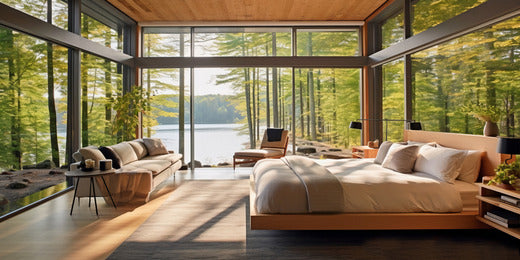
Types of Conditioning Systems
In the quest for the ideal air conditioning system, it's essential to explore the various types available, each with its own set of advantages and disadvantages. Let's delve into the most common types of conditioning systems suitable for hotels and discuss how they can meet your unique needs.
Central Air Conditioning:
Advantages:
- Uniform cooling throughout the hotel.
- Effective for large hotels with many rooms.
- Centralized control for temperature and air quality.
Disadvantages:
- Higher installation and maintenance costs.
- Limited zonal control, which can lead to energy inefficiency.
Split Systems:
Advantages:
- Efficient and versatile for both small and large hotels.
- Zoning capabilities allow for individual room temperature control.
- Lower installation and operational costs compared to central systems.
Disadvantages:
- May require more indoor space for multiple indoor HVAC units.
- Outdoor condenser units can be less aesthetically pleasing.
Ductless Mini-Split Systems:
Advantages:
- Energy-efficient and flexible.
- No need for ductwork, reducing AC installation complexity.
- Individual room control for guest comfort.
Disadvantages:
- May have a higher upfront cost per unit.
- Multiple indoor HVAC units can affect aesthetics if not properly designed.
By exploring these hotel conditioning system options and understanding their respective pros and cons, hotel managers can make informed decisions that align with their property's unique requirements, budget, and guest expectations.
Quality and Reliability
In the realm of hotel management, the importance of choosing high-quality, reliable HVAC units cannot be overstated. The comfort of your guests hinges on the effectiveness and consistency of your conditioning systems. In this section, we emphasize the significance of quality and reliability, guide you in evaluating conditioning system manufacturers, and share tips for ensuring system longevity.
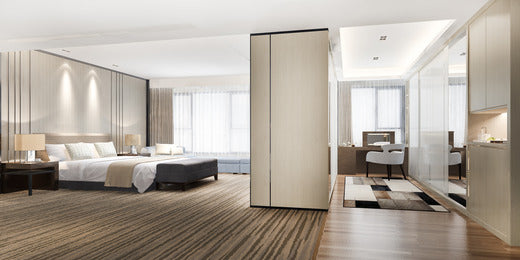
The Importance of Quality and Reliability:
- Guest Comfort: Uninterrupted guest comfort is paramount. Frequent breakdowns and unreliable conditioning systems can lead to guest discomfort, negative reviews, and potential loss of repeat business.
- Operational Efficiency: Quality systems tend to be more energy-efficient, contributing to cost savings over time. They also require less maintenance, reducing operational disruptions.
- Guest Safety: Faulty or poorly maintained systems can pose safety risks, such as electrical issues or air quality concerns. Reliability ensures guest safety.
Evaluating Manufacturers:
When assessing conditioning system manufacturers, consider the following factors:
- Reputation: Research the manufacturer's reputation within the industry. Look for reviews, testimonials, and case studies from other hotels or businesses that have used their products.
- Warranty: Investigate the manufacturer's warranty terms. A longer and more comprehensive warranty often reflects confidence in the product's durability.
- Energy Efficiency Ratings: Review the SEER (Seasonal Energy Efficiency Ratio) ratings of the manufacturer's products. Higher SEER ratings indicate better AC hotel energy efficiency.
- Service and Support: Inquire about the availability of service and support for the manufacturer's products. Reliable customer support is essential in case issues arise.
Tips for Maintenance and Regular Servicing:
- Scheduled Inspections: Implement a regular inspection and maintenance schedule for your conditioning systems. This includes cleaning filters, checking for leaks, and ensuring proper airflow.
- Professional Service: Hire qualified technicians for maintenance and repairs. Professional servicing helps identify and address potential issues before they escalate.
- Filter Replacement: Regularly replace air filters to maintain optimal air quality and system efficiency.
- Zoning Controls: Consider investing in zoning controls that allow you to adjust temperatures in different areas of the hotel, optimizing comfort and energy use.
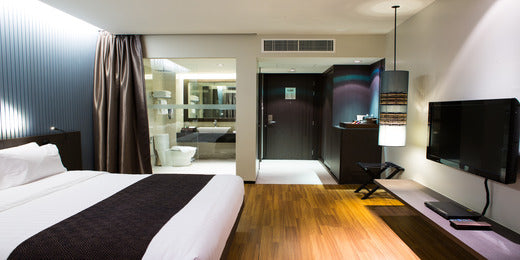
Guest Comfort and Experience
Guest comfort is the cornerstone of a successful hotel. The choice of your conditioning system directly impacts guest satisfaction and the overall experience. In this section, we delve into how conditioning systems influence guest comfort and discuss the crucial factors of noise levels, temperature control, and air quality in guest rooms.
The Impact on Guest Comfort and Satisfaction:
- Temperature Control: Guests have varying preferences when it comes to room temperature. A responsive conditioning system that allows individual temperature control enhances guest comfort.
- Noise Levels: Quiet conditioning systems are essential for an uninterrupted and restful stay. Excessive noise can lead to guest complaints and discomfort.
- Air Quality: Maintaining good indoor air quality is vital for guest health and comfort. Efficient filtration and ventilation systems contribute to a pleasant environment.
Key Factors for Achieving Optimal Guest Comfort:
- Noise Reduction: Invest in conditioning systems known for their quiet operation. Proper insulation and soundproofing can also mitigate noise issues.
- Individual Controls: Whenever possible, provide guests with the ability to adjust the temperature in their rooms to their liking. Smart thermostats and zoning controls facilitate this.
- Air Quality: Ensure regular maintenance of your conditioning systems to keep air filters clean and functioning effectively. Consider air purification options to enhance air quality.
- Temperature Consistency: Maintain consistent temperatures throughout guest rooms. Fluctuations can lead to discomfort and disrupted sleep.
- Guest Education: Inform guests about how to use the conditioning system effectively. Provide clear instructions to help them achieve their desired comfort levels.
By prioritizing guest comfort and addressing key factors such as noise, temperature control, and air quality, your hotel can elevate the guest experience and build a positive reputation that attracts repeat business and word-of-mouth recommendations. A comfortable and satisfied guest is more likely to become a loyal patron, contributing to the long-term success of your hotel.
Environmental Considerations
In today's world, environmental consciousness is paramount, and hotels are increasingly expected to adopt eco-friendly practices, including in their conditioning systems. This section addresses the growing concern for sustainable conditioning options, emphasizing the use of environmentally friendly refrigerants and energy-saving features, and highlighting the benefits of such choices for the environment and the hotel's reputation.
The Call for Eco-Friendly Conditioning:
- Environmental Responsibility: Sustainable conditioning options align with your hotel's environmental responsibility. They help reduce the carbon footprint, contributing to a greener planet.
- Regulatory Compliance: Many regions have stringent regulations on refrigerants due to their environmental impact. Choosing eco-friendly options ensures compliance with these regulations.
- Guest Preference: Modern travelers are increasingly conscious of sustainability. Offering eco-friendly amenities, including conditioning systems, can attract environmentally aware guests.
Environmental Benefits of Sustainable Choices:
- Environmentally Friendly Refrigerants: Opt for conditioning systems that use refrigerants with a lower Global Warming Potential (GWP). These refrigerants have a reduced impact on climate change.
- Energy Efficiency: Energy-efficient systems not only save costs but also reduce energy consumption, leading to lower greenhouse gas emissions.
- Renewable Energy Integration: Explore options for integrating renewable energy sources like solar panels to power your conditioning systems, further reducing environmental impact.
- Sustainability Certification: Consider systems with certifications like ENERGY STAR, which indicate high AC hotel energy efficiency and reduced environmental impact.
Installation and Maintenance
The proper AC installation and maintenance of your air conditioner are pivotal to their performance, longevity, and guest satisfaction. In this section, we provide insights into the installation process, stress the importance of professional installation, offer guidance on maintenance practices, and highlight the role of trained staff or contractors in ensuring system reliability.
Professional Installation:
- Expertise Matters: Proper installation requires technical expertise to ensure that the system operates efficiently and reliably.
- Sizing and Placement: Professional installers determine the appropriate size and location of equipment for optimal performance and guest comfort.
Regular Maintenance Practices:
- Scheduled Inspections: Conduct routine inspections to check for leaks, clean filters, and assess system performance.
- Filter Replacement: Regularly replace air filters to maintain air quality and system efficiency.
- Condenser and Evaporator Coil Cleaning: Ensure that the condenser and evaporator coils are clean and free of debris for efficient heat exchange.
The Role of Trained Staff or Contractors:
- Technical Expertise: Trained staff or contractors possess the technical knowledge required to diagnose and address issues effectively.
- Efficient Repairs: Timely repairs by experts reduce downtime and prevent guest discomfort.
- Emergency Response: Trained personnel can provide rapid responses to system failures, ensuring minimal guest disruption.
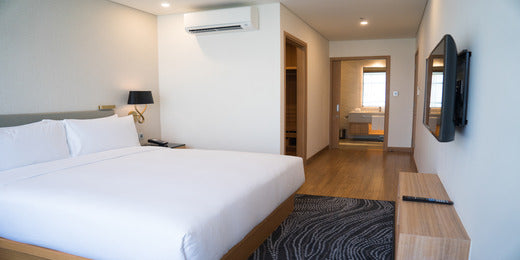
Budgeting and Cost Analysis
Budgeting for your conditioning system is a strategic process that requires careful consideration of various costs, including purchase, AC installation, and ongoing maintenance. In this section, we delve into budgeting considerations, offer practical tips for conducting cost-benefit analyses, and provide a template or framework for hotel managers to create a comprehensive budget.
Budgeting Considerations:
- Initial Purchase: Account for the upfront cost of the conditioning system, including equipment and installation.
- Operational Costs: Estimate ongoing operational costs, such as energy consumption, maintenance, and repairs.
- Lifecycle Costs: Consider the total cost of ownership over the expected lifespan of the system.
Cost-Benefit Analysis:
- ROI Assessment: Conduct a comprehensive cost-benefit analysis to determine the Return on Investment (ROI) of different conditioning options.
- Energy Efficiency Savings: Factor in potential energy savings when choosing an energy-efficient system.
- Maintenance and Repairs: Include estimated costs for routine maintenance and potential repairs.
Creating a Comprehensive Budget:
- Template or Framework: Provide a template or framework for hotel managers to create a budget that includes all relevant expenses.
- Contingency Fund: Consider including a contingency fund to cover unexpected maintenance or repair costs.
- Long-Term Planning: Encourage hotel managers to plan for the long term by considering the lifecycle costs and potential system upgrades.
By carefully considering budgeting and cost analysis for air conditioners, hotel managers can make financially sound decisions while ensuring the comfort and satisfaction of their guests. Balancing cost efficiency with guest experience is essential for the long-term success and reputation of the hotel.


































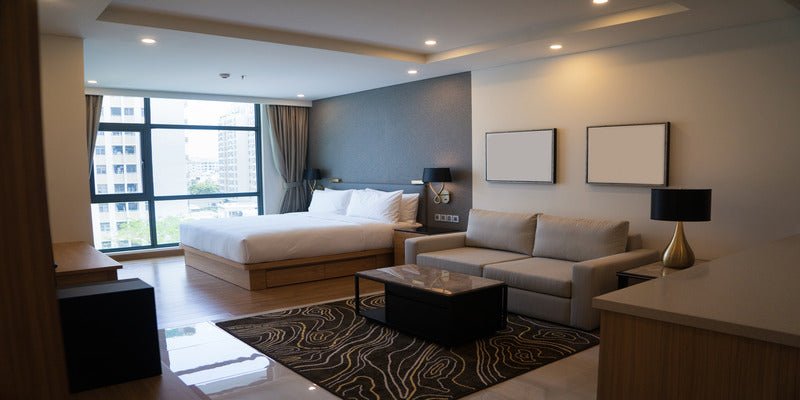
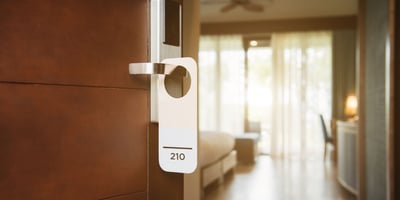
.jpg?height=200&name=photo_2024-07-05_21-25-23%20(1).jpg)
-min%20(1).jpg?height=200&name=shutterstock_1616234788%20(1)-min%20(1).jpg)
.jpg?height=200&name=type-entertainment-complex-the-popular-resort-with-pools-and-water-parks-in-turkey-with-more-than-5-million-visitors-a-year-amara-dolce-vita-luxury-hotel-resort-tekirova-kemer_146671-18727%20(1).jpg)


